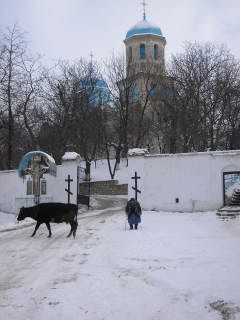Kere's Landsphere
Travelogue from points around the world.
Sunday, March 04, 2007
Finally, Snow!
So, last week, Moldova finally experienced winter. A deep blanket of snow coated the city, a gossamer white pillow of noiseless beauty, that in a few days was wholly transformed into mucky swaths of soiled, dripping slush. Ah, Moldova in winter.
As many in Europe, I wondered whether we would have a winter at all this year. Granted, last year's winter nearly did me in. It was cold and snowy for five or six months. And in Moldova, they don't shovel the walks; so in addition to being cold and miserable for half a year you are also fearful for walking cuz you might slip on the sedimentary layers of ice that have accumulated and fall into the path of an oncoming maxi taxi. So, no, I can't say I was really sad to have been spared the shivering misery of winter this year. But, I am deeply troubled by the trend of global warming. And its not just because of the potential for Bangladesh to become the next Atlantis and for all the polar bears to die. No, I am worried about losing one of the last relics of humanity's living history.
Let me explain.
One of the reasons I came to Moldova originally, one of the few things I get a kick out of being here, is the fact that Moldova is a living museum of the world as it was before industrialization and modernization. People still use outhouses in the villages, and the cities are not much further along. Moldova is as most of the world was for thousands of years, at least the world of Europe. The majority of Moldovans live the life that people lived since the establishment of civilization (sans such amenities as color TV of course). Here, people live with the earth and accord themselves to its moods. People milk their cows in the morning, squash grapes into wine in the autumn, and plant in the spring. And, most importantly, people suffer through winter.
Winter, for the great bulk of human history, has been a time of hardship. Except for those of us living in this thin slice of modern time, humanity has always faced winter with hardened desperation. You save up what you can in the autumn and then, after one last hurrah feast (Thanksgiving in America) you hunker down with what you've got and hope to God it lasts until Spring. And what you have isn't much. Root vegetables like potatoes and beets and a few heads of molding cabbage. Rice and wheat and, if it gets really bad, the slowly emaciating frame of your family's cow. Sure, it was hard, but this was Life. This was Existence, at least as far as anyone knew; that is, until hothouses and intercontinental trade became not only feasible but common practices. Now you can pick up a red (if tasteless) tomato in Safeway or Sainsbury's any time of the year. At least if you live in America or Western Europe. But it's important to remember that the great majority of human history was not like this, and one place where this history still lives to remind us is Moldova. Moldova and such countries like it are living testaments to the struggles and hardships our ancestors all endured, especially the hardship of winter.
At least, until now.
With global warming, the hardship of winter is lost. Maybe this is not such a "bad" thing, but it is an unfortunate thing. Unfortunate, because if there is nowhere left on Earth where we may experience what the great majority of humanity experienced in the millenniums of the past before the modern age, then we have lost any chance of really connecting with our human legacy. We completely dissever our link with the humanity that we were, and with that we lose much of what we are.
I dread the loss of long winters like I dread the overwhelming spread of globalization. I cling to the zones of difference, hardship, and agrarianism that still flourish on the earth. Maybe it's not a fair attitude to the people who live in these zones, those who just want their MTV like the rest of us. But these zones are vital, for without them and the living testaments to the past they represent, we forget what it was to be human. These places remind us of the sacrifices that humanity made to get us where we the lucky are today, and without them we run the risk of becoming ungrateful, of taking modernity for granted, and of losing the thread of our human heritage.

